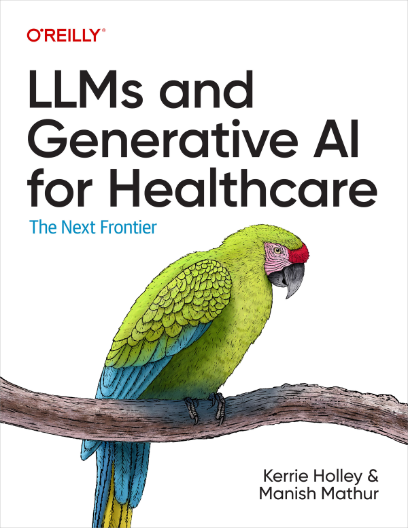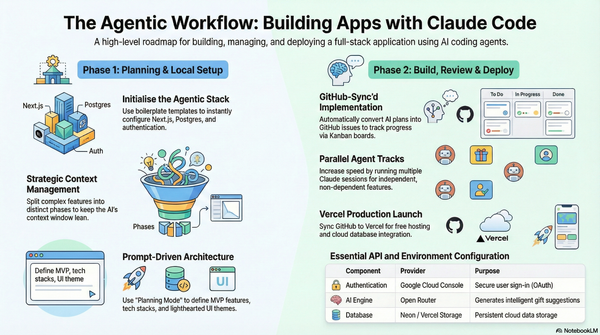LLMs and Generative AI for Healthcare - The Next Frontier 2024

Authors: Kerrie Holley and Manish Mathur
Disclaimer: The views expressed in this briefing doc are those of the authors and do not represent the publisher's views. The information and instructions presented here are for informational purposes only and should not be considered medical advice.
Main Themes
This book explores the burgeoning field of Large Language Models (LLMs) and Generative AI, particularly their transformative potential within the healthcare sector. The authors meticulously dissect the inner workings of LLMs, highlighting their components like transformers, tokens, and attention mechanisms, and showcase how these models can revolutionize various aspects of healthcare, from drug discovery to patient care.
Key Concepts and Applications
- LLMs: The Next Frontier in Healthcare: LLMs are powerful tools capable of processing and understanding vast amounts of data, including medical literature, patient records, and clinical trial data. The authors envision LLMs as "stethoscopes of the future," augmenting clinicians' abilities to diagnose, treat, and manage patients effectively.
- "Just as stethoscopes and X-ray machines extend a clinician’s abilities to assess a patient’s health, LLMs can enhance a clinician’s capacity to analyse and interpret large amounts of research data, email threads with embedded videos, a patient’s historical health records, clinical notes, discharge summaries, and more."
- Transforming Drug Discovery and Development: LLMs can accelerate drug discovery by analysing complex biological data, identifying potential drug candidates, and predicting their efficacy and potential side effects.
- "LLMs can be trained on such databases, as well as published research papers and clinical trial data to detect correlations between what types of drugs have which properties and can lead to which outcomes."
- Revolutionizing Patient Care: From personalized health assistants to AI-driven symptom checkers, LLMs can significantly improve patient experience, empower them with knowledge, and enhance their engagement in their healthcare journey.
- "Additionally, LLMs could be used to run empathetic virtual health assistants that can converse with patients in a way that’s supportive and encouraging."
- Enhancing Public Health Initiatives: LLMs can play a crucial role in disease surveillance, public health education, and disaster preparedness by analysing vast datasets, identifying patterns, and generating tailored content for different demographics.
- "The use of LLMs can enable faster and better disease surveillance, by rapidly combing through huge swathes of health data from a variety of sources to identify fine-grained signals that could indicate an imminent outbreak or changes in the trend of a disease."
- Ethical Considerations and Challenges: The authors emphasize the importance of ethical oversight in LLM development and deployment, highlighting potential biases, privacy concerns, and the need for transparency and explain ability in AI-driven healthcare solutions.
- "These, after all, are data about people, and you can’t just run roughshod over concerns about data privacy, questions about informed consent, or fair access to genomic technology."
- The Future of LLMs in Healthcare: The book concludes with a vision of a future where LLMs with "infinite context windows" can process a patient's entire medical history, enabling more precise diagnoses, personalized treatment plans, and proactive disease prevention strategies.
- "The promise of personalized healthcare would be a big step forward. LLMs with infinite context windows or prompts could process and store large amounts of medical literature, clinical trial data, patient medical history, and clinical data, allowing for a comprehensive and updatable medical knowledge base for a patient or consumer."
Notable Examples
- Medical Swiss Army Knife App: A hypothetical consumer app powered by a medical-specific LLM offering diverse functionalities like appointment scheduling, history summarization, provider steerage, and plain-language explanations of doctor instructions.
- ScribeMD: An existing LLM solution designed for generating doctor letters, allowing physicians to dictate key points and have the AI craft a complete professional missive, adapting to individual provider style and specialties over time.
Challenges and Future Directions
The authors acknowledge that LLMs are still evolving and face challenges like potential biases in training data, the need for robust security measures, and the imperative of building trust among healthcare professionals and patients. Addressing these challenges is crucial for realizing the full potential of LLMs in revolutionizing healthcare.
Conclusion
This book provides a comprehensive overview of the current state and future possibilities of LLMs and generative AI in healthcare. It highlights both the immense potential and the critical challenges that need to be addressed to ensure responsible and ethical development and deployment of these powerful technologies.
Click here to purchase on Amazon today!

